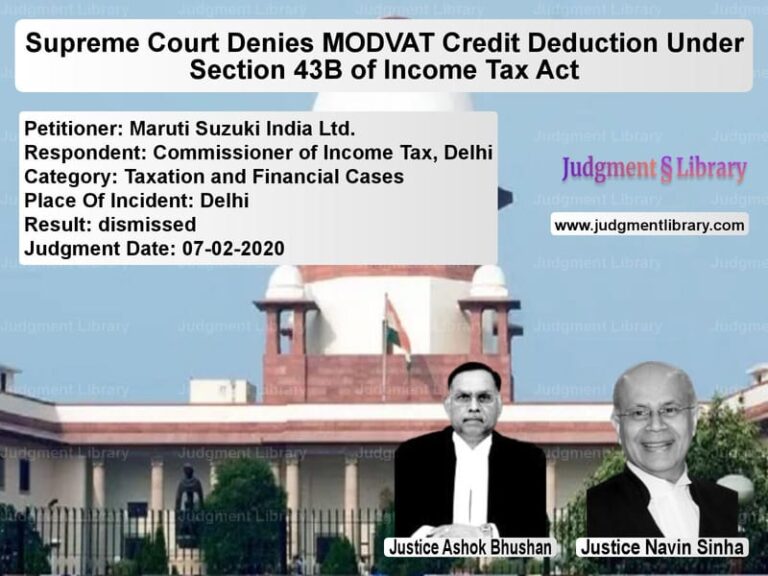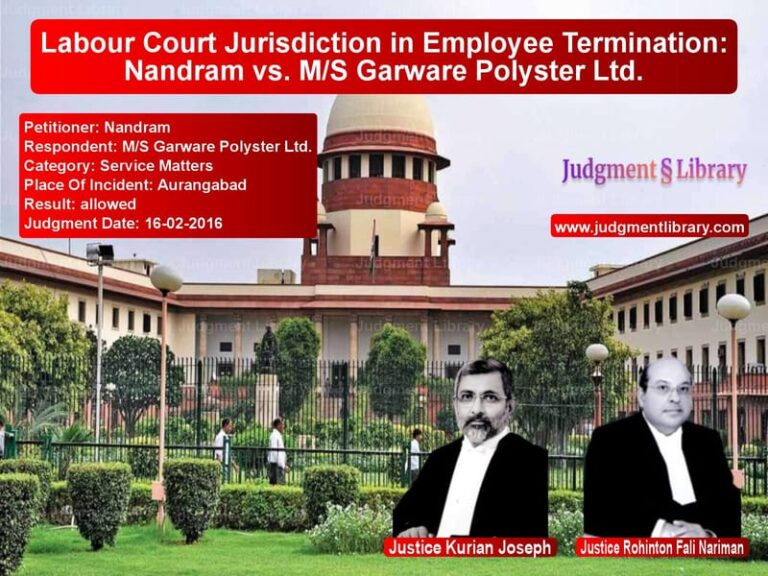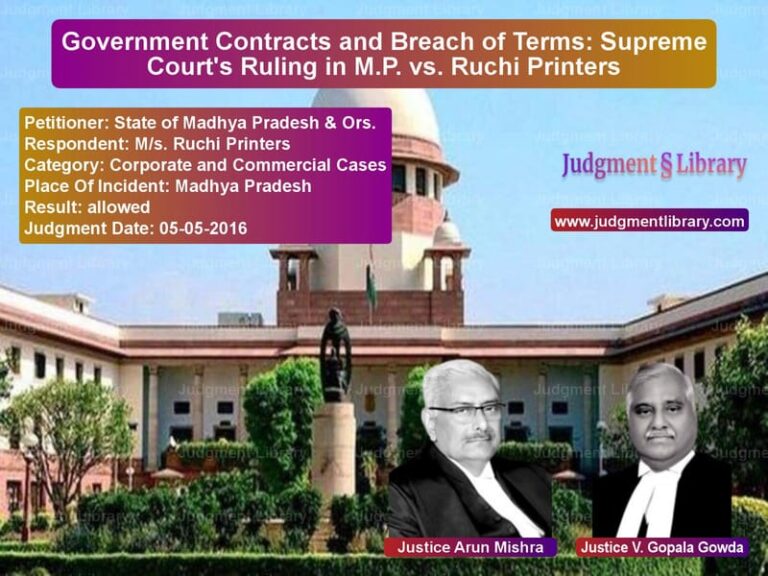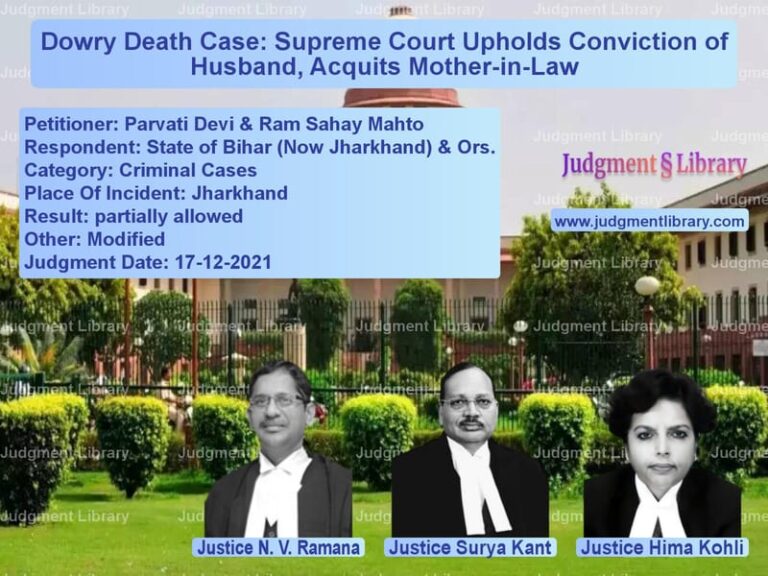National Textile Corporation Lease Dispute: Supreme Court Reviews Eviction Order
The legal dispute in Union of India vs. Nareshkumar Badrikumar Jagad & Others revolves around the leasehold rights of a textile undertaking located in Mumbai. This case is particularly significant as it involves a conflict between a property trust and the National Textile Corporation (NTC), with the central issue being whether the leasehold rights of the textile mill premises vested in the Union of India under the Textile Undertakings (Nationalisation) Laws (Amendment and Validation) Act, 2014. The judgment delivered by the Supreme Court highlights the complexities involved in property disputes when legislative interventions modify pre-existing legal rights.
The matter reached the Supreme Court through a review petition filed by the Union of India, challenging an earlier judgment passed in 2011 that directed the eviction of NTC from the disputed premises. Before the eviction could take place, the government enacted the Validation Act, 2014, which retrospectively vested leasehold rights in the central government, thereby creating a legal dilemma over the enforceability of the eviction order.
Background of the Case
The land in question, covering an area of 12,118 square yards, was originally leased in 1893 for 99 years to Hope Mills Ltd. Over time, the leasehold rights were transferred to various textile companies, eventually culminating in the ownership of Podar Mills Ltd. In 1983, the Government of India took over the management of Podar Mills under the provisions of the Textile Undertakings (Taking Over of Management) Act, 1983. Subsequently, the ownership of the mills was nationalized under the Textile Undertakings (Nationalisation) Act, 1995.
However, the original lease expired in 1990, and the landlord, a private property trust, sought possession of the land. The trust filed a suit for eviction, arguing that the lease had lapsed, and the government had no right to continue possession without renewal.
Legal Proceedings and High Court’s Verdict
The eviction proceedings first went through the trial court, which ruled in favor of the trust. The case then moved to the High Court, where the court upheld the trial court’s decision and directed NTC to vacate the premises. The High Court found that since the lease had expired, the continued occupation by NTC was illegal and could not be justified under the existing nationalization laws.
Supreme Court’s 2011 Judgment
The matter was subsequently appealed before the Supreme Court, where in 2011, the apex court upheld the eviction order, emphasizing that NTC’s possession was unauthorized after the expiry of the lease. The Court directed NTC to vacate the premises within a stipulated period and hand over possession to the trust.
Enactment of the Validation Act, 2014
Before the eviction could be executed, the central government passed the Textile Undertakings (Nationalisation) Laws (Amendment and Validation) Act, 2014, which retroactively vested the leasehold rights of nationalized textile mills in the Union of India. This legislative intervention effectively sought to nullify the impact of the Supreme Court’s 2011 ruling, leading to a fresh legal challenge.
Key Legal Issues and Arguments
Union of India’s Argument
- The Validation Act, 2014, retrospectively vested the leasehold rights in the central government, making the previous eviction order unenforceable.
- The legislative intent behind the amendment was to protect nationalized textile undertakings and ensure continuity of industrial operations.
- The government had a legitimate right to retain the leasehold interest since the mills were serving a larger economic and employment purpose.
Trust’s Argument
- The Supreme Court’s 2011 judgment had attained finality and could not be nullified by subsequent legislative action.
- The lease had expired in 1990, and no valid renewal was ever executed; therefore, continued possession by NTC was unlawful.
- The Validation Act, 2014, was unconstitutional as it sought to override a final judicial decision, violating the principle of separation of powers.
Supreme Court’s Observations
The Supreme Court examined whether the retrospective application of the Validation Act, 2014, could alter the legal status of the tenancy and render the eviction order void. The Court noted:
“The enactment of the Validation Act, 2014, has materially changed the legal rights of the parties. The legislative intent is clear in providing the Union of India with leasehold rights over nationalized textile undertakings.”
The Court further observed that since the government had taken over the leasehold rights through an express statutory provision, the landlord could not enforce an eviction against NTC, which was merely an operating entity under the control of the Union of India.
Final Judgment and Conclusion
In light of the legislative changes brought about by the Validation Act, 2014, the Supreme Court ruled that the earlier eviction order could no longer be enforced. The Court held:
“The eviction order passed in 2011 has been rendered unenforceable due to the retrospective effect of the Validation Act. The Trust may seek eviction through appropriate rent control proceedings against the real tenant, the Union of India.”
The Court dismissed the contempt petition filed by the trust for non-compliance with the eviction order, concluding that there was no willful disobedience since the legal landscape had changed due to legislative intervention.
Implications of the Judgment
- Precedence of Legislative Action: This ruling affirms that legislative enactments can alter existing legal relationships, provided they do not violate constitutional principles.
- Protection of Nationalized Industries: The judgment provides relief to textile undertakings that faced eviction due to expired leases, ensuring their continued operations.
- Judicial Deference to Legislative Intent: The ruling highlights the Court’s approach in respecting legislative actions that seek to modify legal rights in the public interest.
Conclusion
The Supreme Court’s judgment in Union of India vs. Nareshkumar Badrikumar Jagad underscores the evolving legal principles governing leasehold rights and nationalized industries. By upholding the retrospective effect of the Validation Act, 2014, the Court reinforced the power of the legislature to modify existing legal relationships while balancing the interests of private property owners. This case sets a significant precedent for future disputes involving legislative interventions in property and tenancy matters.
Petitioner Name: Union of India.Respondent Name: Nareshkumar Badrikumar Jagad & Ors..Judgment By: Justice Kurian Joseph, Justice A.M. Khanwilkar.Place Of Incident: Mumbai, Maharashtra.Judgment Date: 28-11-2018.
Don’t miss out on the full details! Download the complete judgment in PDF format below and gain valuable insights instantly!
Download Judgment: Union of India vs Nareshkumar Badrikum Supreme Court of India Judgment Dated 28-11-2018.pdf
Direct Downlaod Judgment: Direct downlaod this Judgment
See all petitions in Property Disputes
See all petitions in Contract Disputes
See all petitions in Damages and Compensation
See all petitions in Judgment by Kurian Joseph
See all petitions in Judgment by A M Khanwilkar
See all petitions in allowed
See all petitions in supreme court of India judgments November 2018
See all petitions in 2018 judgments
See all posts in Civil Cases Category
See all allowed petitions in Civil Cases Category
See all Dismissed petitions in Civil Cases Category
See all partially allowed petitions in Civil Cases Category






